|
|
|
Sort Order |
|
|
|
Items / Page
|
|
|
|
|
|
|
| Srl | Item |
| 1 |
ID:
125113
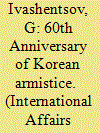

|
|
|
|
|
| Publication |
2013.
|
| Summary/Abstract |
ON JULY 27, 2013, it will be 60 years since the Armistice Agreement was signed in the village of Panmunjom, putting an end to the three-year Korean War. That war, which has become the bloodiest and most devastating military conflict since the end of World War II, remains an unhealed wound for the Koreans while its consequences are still making an impact on the international situation in Northeast Asia and beyond.
|
|
|
|
|
|
|
|
|
|
|
|
|
|
|
|
| 2 |
ID:
106380
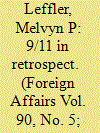

|
|
|
| 3 |
ID:
153580
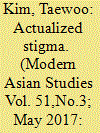

|
|
|
|
|
| Summary/Abstract |
During the Open Port period and Japanese colonial period (1876–1945), Koreans generally had a positive image of the United States. This positive view of the United States held by Koreans persisted until after liberation from Japanese colonial rule in 1945. The United States was a ‘liberator’ that saved the Koreans, and was viewed as ‘a cooperator’ with whom Korea was to solve its national task of establishing a new country. However, the concept of ‘American imperialist warmonger’ had begun to be promoted in North Korea from 1948–49. It was a concept advanced by the Soviet Union and the North Korean leadership. The negative image of the United States, which spread throughout North Korea from the early years of the Cold War, was merely a perplexing stigma lacking substantiated grounds. However, the experiences of the Korean War actualized the image of the United States as a ‘warmonger’ in the hearts of the North Korean people. Alleged indiscriminate aerial bombings, mass slaughters, sexual assaults, and arson attacks against Korean civilians became the most important reason for the expansion of intense sentiment. Anti-Americanism began to be systemized and routinized in every aspect of North Korean life after the Korean War.
|
|
|
|
|
|
|
|
|
|
|
|
|
|
|
|
| 4 |
ID:
110305


|
|
|
|
|
| Publication |
2012.
|
| Summary/Abstract |
In the United States, the decision to go to war has often been propelled by a singular event, a 'trigger' that both galvanises and unites, at least temporarily, the US Congress, the nation's press and the American public. The attack on Pearl Harbor precipitated US entry into the Second World War, and the attack on the World Trade Center on 11 September 2001 led to American military involvement in Afghanistan. In both instances, thousands of innocent Americans had been killed on American soil by an easily identifiable, foreign enemy. The United States entry into the Korean War resulted from a somewhat different kind of trigger. While US forces were not directly attacked, there was, as President Lyndon Johnson's Deputy Undersecretary of State George Ball once wrote, 'a massive land invasion by 100,000 troops … a classical type of invasion across an established border'. Ball argued that North Korea's invasion of South Korea in June 1950 provided 'an unassailable legal and political basis for counteraction'.
|
|
|
|
|
|
|
|
|
|
|
|
|
|
|
|
| 5 |
ID:
001113
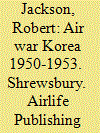

|
|
|
|
|
| Publication |
Shrewsbury, Airlife, 1998.
|
| Description |
160p.hbk
|
| Standard Number |
1853108804
|
|
|
|
|
|
|
|
|
|
|
|
Copies: C:1/I:0,R:0,Q:0
Circulation
| Accession# | Call# | Current Location | Status | Policy | Location |
| 040614 | 951.9042/JAC 040614 | Main | On Shelf | General | |
|
|
|
|
| 6 |
ID:
145401
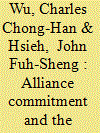

|
|
|
|
|
| Summary/Abstract |
Our study shows that alliance commitment is the key to the maintenance of the status quo between a weak challenger and a major-power attacker. In order to verify our theory, we employ data from Benson's typology of compellent military alliances and conduct empirical tests for our theoretical hypothesis. The statistical results comply with the theory, indicating that a trustful and strong military commitment creates negative effects on the status quo. We examine the cases of the Korean War and US-China-Taiwan relations to buttress our arguments. The latter case also shows the need to modify our original model under certain conditions.
|
|
|
|
|
|
|
|
|
|
|
|
|
|
|
|
| 7 |
ID:
095262
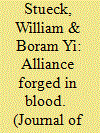

|
|
|
|
|
| Publication |
2010.
|
| Summary/Abstract |
The US occupation of Korea from 1945 to 1948 was not notable for its success. The volatile interaction between the occupiers and the occupied provided an important context for its relatively rapid conclusion and for Washington's ineffective employment of deterrence in the lead-up to the June 1950 North Korean attack on South Korea. This essay describes the volatile interaction between Americans and Koreans on the peninsula and the circumstantial, psychological, and cultural factors behind it. The essay concludes by analyzing the psychological impact of the Korean War on the relationship and how this and later cultural changes have made possible an enduring alliance between the United States and the Republic of Korea.
|
|
|
|
|
|
|
|
|
|
|
|
|
|
|
|
| 8 |
ID:
122407
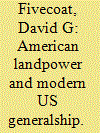

|
|
|
|
|
| Publication |
2012-13.
|
| Summary/Abstract |
Like his earlier works, Tom Ricks's The Generals: American Military
Command from World War II to Today, is entertaining and provocative, and has deservedly been the topic of numerous reviews,
blog posts, and discussions around the military. His central thesis is that,
since the Korean War, the United States Army has failed to produce
general officers who could link strategy with tactics. Ricks argues that one
remedy for this deficiency is for the Army to resume publicly firing division commanders for operational shortcomings as a means to increase
accountability, like it did under General George C. Marshall in World War
II. Ricks is on solid evidentiary ground while documenting the patterns
of relief for World War II division commanders, supplementing stories
with data. But in his discussion of the leaders of every war afterwards,
Ricks switches to anecdotes and assertions to make his case. He also shifts
his reference group from division commanders to theater commanders.
Much has changed in seventy years, but then, as now, there are significant
differences between two and four star generals. Thus, his argument is on
less-than-solid ground as he compares World War II "two-star apples" to
modern "four-star oranges."
|
|
|
|
|
|
|
|
|
|
|
|
|
|
|
|
| 9 |
ID:
111050
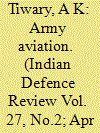

|
|
|
| 10 |
ID:
121535
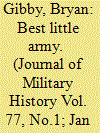

|
|
|
|
|
| Publication |
2013.
|
| Summary/Abstract |
Historians have generally assumed that the poor showing made by the South Korean military in the opening stages of the Korean War was inevitable and have attributed much of the blame for this to the U.S. Army advisory group in Korea, known colloquially as "KMAG." However, a closer look at the documentary evidence shows that KMAG was keenly aware of the South Korean military's shortcomings and was doing its best to correct them as war came. Although KMAG's program to improve the equipment and leadership of the South Korean military and to focus its efforts on conventional defense, as opposed to counterinsurgency activities, proved insufficient to stop the North Korean invasion, U.S. advisors did succeed in forging an infrastructure that allowed the South Korean army to survive and eventually to grow into a potent military force during the war.
|
|
|
|
|
|
|
|
|
|
|
|
|
|
|
|
| 11 |
ID:
108882
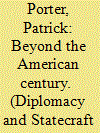

|
|
|
|
|
| Publication |
2011.
|
| Summary/Abstract |
As the United States became a world Power, journalist and intellectual Walter Lippmann feared that it would become its own worst enemy. During and after the Second World War, he tried to steer the country towards coherent statecraft, to define the national interest and the limits of power, and give geopolitical expression to the role of the United States as the core of an Atlantic strategic system. But in response to world war, the Truman Doctrine, and the Korean War, he became pessimistic about the country's ability to conduct strategy effectively. In the prophetic tradition, he believed that a fatal symbiosis between America's growing strength and domestic politics led it towards crisis. Though at times ahistorical, Lippmann's concept of strategy deserves attention for its dialogue between power and identity, for its questioning of "ends" as well as means, and for its focus on the danger of self-defeating behaviour.
|
|
|
|
|
|
|
|
|
|
|
|
|
|
|
|
| 12 |
ID:
095266
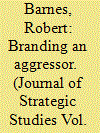

|
|
|
|
|
| Publication |
2010.
|
| Summary/Abstract |
The crisis following China's intervention in the Korean War led to a significant rift between the United States and the Commonwealth at the United Nations (UN). This article examines the conditions under which the Commonwealth became united and was able to directly influence UN decision-making. It concludes that, when united, the Commonwealth could not easily be ignored by Washington, and thereby acted as an agent of constraint upon the Western superpower.
|
|
|
|
|
|
|
|
|
|
|
|
|
|
|
|
| 13 |
ID:
095273
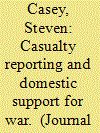

|
|
|
|
|
| Publication |
2010.
|
| Summary/Abstract |
The common argument that public support for war is casualty sensitive ignores the fact that casualty figures are not revealed automatically. While the military decides when, and to whom, to release such information, political elites can question, even condemn, how the government goes about this business. After briefly exploring how the US military operated during the two world wars, this article focuses on American casualty reporting during the Korean War, arguing that the way the figures were revealed often sparked enormous political controversy, which at two crucial moments helped to undermine domestic support for this distant war.
|
|
|
|
|
|
|
|
|
|
|
|
|
|
|
|
| 14 |
ID:
193502
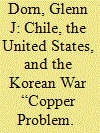

|
|
|
|
|
| Summary/Abstract |
On May 2, 1952, Chilean President Gabriel González Videla, a staunch U.S. ally, suddenly terminated the Washington Agreement governing the sale of copper to the United States, in effect, imposing an embargo and nationalizing the export of copper in the midst of the Korean War. For U.S defense planners, who had based their mobilization and rearmament program upon the strict control of copper, steel, and aluminum, the metals that enabled them to “control practically all production” in the nation, this was an unexpected and dangerous blow. “The loss that we would sustain by not having access to Chilean copper would be irreparable,” the head of the National Production Administration (NPA) Copper Division warned, “as there is no conceivable way whereby we could meet current programs.”1 Although it was always clear that the embargo was a negotiating tool rather than a belligerent act, subsequent threats to sell copper across the Iron Curtain and nationalize the mines lent the move additional gravity. This “copper problem” only ended when González Videla’s successor, Carlos Ibañez del Campo, under U.S. pressure, enacted a new copper law, the Nuevo Trato (“New Deal”), in 1955. The Nuevo Trato represented a triumph for rightists in Chilean politics, the failure of Chilean efforts to challenge the U.S. government and copper companies, and a temporary lull in efforts to exert control over Chile’s most critical industry.
|
|
|
|
|
|
|
|
|
|
|
|
|
|
|
|
| 15 |
ID:
095264
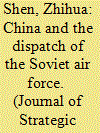

|
|
|
|
|
| Publication |
2010.
|
| Summary/Abstract |
China's entry into the Korean War, together with the involvement of the Soviet Air Force, constituted not only the base of Chinese and Soviet joint assistance to North Korea but also the formation of the Sino-Soviet-North Korean triangular alliance. Recently declassified Russian Defense Ministry archives show that Stalin wavered on dispatching the Soviet Air Force for fear of a direct confrontation with the US/UN forces. It was 12 days after Chinese troops entered the war that Stalin finally allowed the Soviet Air Force to provide air cover. New documents that shed light on this enormously significant historical process demonstrate that the Sino-Soviet-North Korean triangular relationship was extremely delicate and weak.
* An early version of this article was translated by Yang Jingxia and Douglas A. Stiffler, Juniata College. Yafeng Xia, Long Island University, molded the article to its final form.
|
|
|
|
|
|
|
|
|
|
|
|
|
|
|
|
| 16 |
ID:
130426
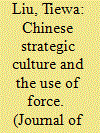

|
|
|
|
|
| Publication |
2014.
|
| Summary/Abstract |
This article reviews and explains Chinese attitudes towards the use of force in international affairs, especially from the perspective of strategic culture. The author traces back the traditional values which originated from ancient Chinese thoughts and also researches Mao Zedong's perception of war, which symbolizes the contemporary Chinese military strategic theory, and Deng Xiaoping and Hu Jintao's discourse on war thereafter, which represents the beliefs of the Chinese government after adopting the opening-up and reform policy. The case studies of the Korean War, the Vietnam War and the two Iraq Wars further explore the principles which dominate the diplomatic decision-making processes. The article concludes that China, in the predictable future, will still firmly adhere to the principles of state sovereignty, non-interference and non-use of force principles, while at the same time China will not hesitate to participate in the multilateral operations which are ratified with UN Security Council authorization and contribute increasingly to improving humanitarian situations due to its moral and political understanding of the use of force in international relations
|
|
|
|
|
|
|
|
|
|
|
|
|
|
|
|
| 17 |
ID:
067720
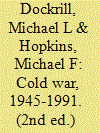

|
|
|
|
|
| Edition |
2nd ed.
|
| Publication |
Hampshire, Palgrave Macmillan, 2006.
|
| Description |
xvi, 188p.Pbk
|
| Series |
Studies in European History
|
| Standard Number |
1403933383
|
|
|
|
|
|
|
|
|
|
|
|
Copies: C:1/I:0,R:0,Q:0
Circulation
| Accession# | Call# | Current Location | Status | Policy | Location |
| 050661 | 909.825/DOC 050661 | Main | On Shelf | General | |
|
|
|
|
| 18 |
ID:
092263
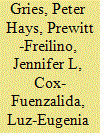

|
|
|
|
|
| Publication |
2009.
|
| Summary/Abstract |
Chinese and Korean protests over "revisionist" Japanese histories of World War II are well known. The impact of contested Chinese and US histories of the Korean War on US-China relations today has received less attention. More broadly, there has been little research seeking to systematically explore just how history textbook controversies matter for international relations. This article experimentally manipulates the impact of nation (US/China), of source (in-group/out-group textbooks), and of valence (positive/negative historical narratives) on measures of beliefs about the past, emotions, collective self-esteem, and threat perception in present-day US-China relations. A 2 × 2 × 2 design exposed randomized groups of Chinese and US university students to fictional high school history textbook accounts of the Korean War. Findings reveal significant effects of nation, source, and valence and suggest that the "historical relevance" of a shared past to national identities in the present has a dramatic impact on how historical controversies affect threat perception.
|
|
|
|
|
|
|
|
|
|
|
|
|
|
|
|
| 19 |
ID:
129554
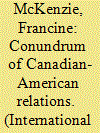

|
|
|
|
|
| Publication |
2014.
|
| Summary/Abstract |
Forty years ago, political scientist Denis Stairs published The Diplomacy of Constraint, an account of Canadian involvement in the Korean War. Stairs explored the attempts of Canadian politicians, diplomats, and bureaucrats to constrain US intervention in Korea and, more generally, to influence the conduct of its foreign policy in the pressurized context of the early Cold War. Since then, historians and political scientists have continued to publish accounts of Canadian involvement in the Korean War and books on Canada-US relations in general. Why, then, should someone read The Diplomacy of Constraint today when there are more recent analyses? This review essay attempts to explain the longevity and usefulness of Stairs' study. What have scholars learned from Stairs' interpretation and approach? Has he influenced subsequent academic analyses? Can his study be considered a model of interdisciplinary scholarship? Finally, is new scholarship intrinsically better than old?
|
|
|
|
|
|
|
|
|
|
|
|
|
|
|
|
| 20 |
ID:
097795
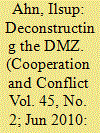

|
|
|
|
|
| Publication |
2010.
|
| Summary/Abstract |
The Demilitarized Zone (DMZ) has been a global symbol of perpetual conflict, hatred and distrust since its establishment in 1953 after the Korean War. The 155-mile ceasefire line has given birth to moral pathologies in the minds of Korean people that include 'otherness is evil', 'containment of war is peace' and 'restoration of the same is unification'. The purpose of this article is to reduce these moral pathologies through Jacques Derrida's deconstructive approach and Emmanuel Levinas's ethics of the Other. Through tripartite reduction of these moral ideologies of the DMZ, an ethical thesis is developed that peace is not a mere state of the absence of war, but rather a welcoming of radical others and differences. It is also argued that unification is not about restoring the same 'original we', but about co-reconstruction of the 'democratic we'.
|
|
|
|
|
|
|
|
|
|
|
|
|
|
|
|
|
|
|
|
|